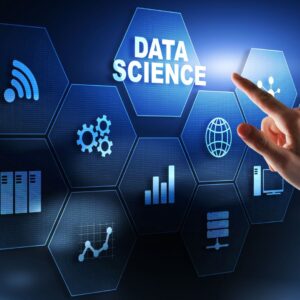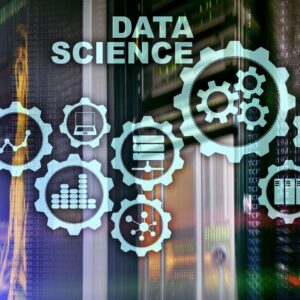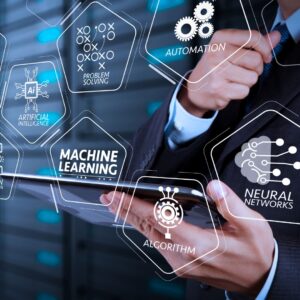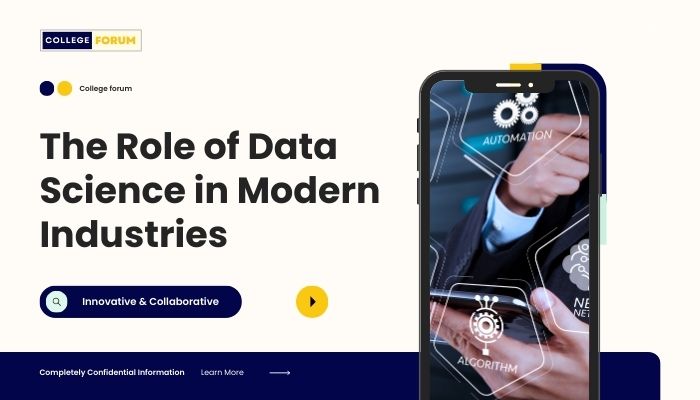Introduction
In today’s digital era, data is the new gold. It powers everything from social media to healthcare to finance. The sheer volume of data generated every day is staggering, and making sense of this data is where data science comes into play. This article explores the role of data science in various modern industries, demonstrating its profound impact and the potential it holds for the future.
What is Data Science?

Definition and Key Components
Data science is an interdisciplinary field that combines statistics, computer science, and domain knowledge to extract insights from data. It involves processes like data collection, cleaning, analysis, and visualization, aiming to turn raw data into actionable insights.
Evolution of Data Science
The field has evolved significantly over the past few decades. Initially focused on statistical analysis, it has grown to include advanced techniques like machine learning and artificial intelligence (AI), enabling the analysis of massive datasets with unprecedented accuracy and speed.
The Tools of Data Science

Software and Programming Languages
Data scientists rely on various tools to process and analyze data. Popular programming languages include Python, R, and SQL. These languages offer powerful libraries and frameworks, such as Pandas, NumPy, and TensorFlow, which facilitate data manipulation, statistical analysis, and machine learning.
Data Visualization Tools
Visualizing data is crucial for interpreting results and making data-driven decisions. Tools like Tableau, Power BI, and Matplotlib help create interactive and comprehensible visualizations, allowing stakeholders to grasp complex insights quickly.
Data Science in Healthcare

Predictive Analytics in Patient Care
In healthcare, data science is revolutionizing patient care through predictive analytics. By analyzing patient data, healthcare providers can predict disease outbreaks, personalize treatment plans, and improve patient outcomes. For instance, wearable devices collect real-time health data that can be used to monitor chronic conditions and alert patients and doctors to potential health issues before they become critical.
Drug Discovery and Development
Data science accelerates drug discovery by analyzing biological data to identify potential drug candidates. Machine learning algorithms can simulate how new drugs interact with the human body, reducing the time and cost of bringing new treatments to market. Additionally, genomics and proteomics data are being leveraged to develop personalized medicines tailored to individual genetic profiles.
Data Science in Finance

Risk Management
In finance, data science is essential for risk management. By analyzing historical data, financial institutions can predict market trends, assess credit risk, and make informed investment decisions, minimizing potential losses. Predictive models help in assessing the risk associated with different financial products and in strategizing to mitigate those risks effectively.
Fraud Detection
Fraud detection systems powered by data science can identify unusual patterns and anomalies in transaction data, helping financial institutions detect and prevent fraudulent activities in real time. Machine learning models continuously learn from new data, improving their accuracy and reducing false positives over time.
Algorithmic Trading
Algorithmic trading relies on data science to analyze market data and execute trades at optimal times. High-frequency trading algorithms can process vast amounts of data and make split-second decisions, giving traders a competitive edge in the financial markets.
Customer Insights and Personalization
Data science allows financial institutions to gain deep insights into customer behavior and preferences. By analyzing transaction data and customer interactions, banks and financial services can offer personalized products and services, enhancing customer satisfaction and loyalty.
Data Science in Retail

Customer Behavior Analysis
Retailers use data science to analyze customer behavior, preferences, and purchase patterns. This information helps them optimize inventory, personalize marketing efforts, and enhance the overall customer experience. By understanding what customers want and when they want it, retailers can tailor their offerings to meet demand more effectively.
Inventory Management
Efficient inventory management is crucial for retail success. Data science models can predict demand, manage stock levels, and reduce wastage, ensuring products are available when and where customers need them. This reduces the cost of holding inventory and minimizes stockouts and overstock situations.
Dynamic Pricing Strategies
Data science enables dynamic pricing strategies where prices are adjusted based on real-time supply and demand, competitor pricing, and other external factors. This helps retailers maximize profits and remain competitive in a rapidly changing market.
Enhancing Customer Experience
Retailers can use data science to enhance customer experience by analyzing feedback, monitoring social media sentiment, and implementing personalized recommendations. This helps in creating a seamless shopping experience, both online and offline.
Data Science in Marketing

Personalized Marketing Strategies
Data science enables marketers to create personalized marketing campaigns by analyzing customer data. These targeted strategies increase engagement and conversion rates by delivering relevant content to the right audience at the right time. Personalization can include tailored email campaigns, product recommendations, and targeted advertisements.
Market Trend Analysis
Analyzing market trends is vital for staying competitive. Data science tools can identify emerging trends, customer preferences, and market dynamics, allowing businesses to adapt their strategies proactively. By staying ahead of trends, companies can innovate and capture new market opportunities.
Social Media Analytics
Social media platforms generate vast amounts of data that can be analyzed to understand customer sentiment, engagement levels, and brand perception. Data science helps marketers track campaign performance, identify influencers, and optimize social media strategies to boost brand awareness and customer engagement.
Customer Segmentation
Customer segmentation involves dividing a customer base into distinct groups based on specific characteristics. Data science techniques such as clustering and classification can identify these segments, enabling more precise targeting and tailored marketing efforts.
Data Science in Manufacturing

Predictive Maintenance
Manufacturers use predictive maintenance to forecast equipment failures before they occur. By analyzing sensor data and machine performance, they can schedule maintenance, reduce downtime, and extend equipment life. This proactive approach helps in preventing costly breakdowns and maintaining continuous production.
Quality Control
Data science enhances quality control processes by monitoring production data for defects and inconsistencies. This ensures products meet quality standards, reducing waste and improving customer satisfaction. Advanced analytics can identify root causes of defects and suggest corrective actions.
Supply Chain Optimization
Optimizing supply chains involves managing logistics, inventory, and production schedules efficiently. Data science models can predict demand, optimize routing, and manage supplier relationships, ensuring a smooth and cost-effective supply chain operation.
Process Automation
Automation of manufacturing processes using data science and AI leads to increased efficiency and reduced human error. Predictive models can automate routine tasks, monitor equipment performance, and adjust production parameters in real-time.
Data Science in Education

Personalized Learning Experiences
In education, data science helps create personalized learning experiences by analyzing student performance and learning styles. This allows educators to tailor their teaching methods to individual needs, improving student outcomes. Adaptive learning platforms use data to recommend personalized learning paths and resources.
Administrative Improvements
Educational institutions use data science to streamline administrative processes. This includes optimizing resource allocation, improving student retention rates, and enhancing operational efficiency. Data-driven insights help in decision-making and strategic planning.
Predictive Analytics for Student Performance
Predictive analytics can identify students at risk of underperforming or dropping out by analyzing factors such as attendance, grades, and engagement levels. Early intervention strategies can be developed to support these students and improve their academic success.
Enhancing Curriculum Development
Data science aids in curriculum development by analyzing the effectiveness of different teaching methods and course materials. This helps in creating more effective and engaging curricula that meet the needs of diverse student populations.
Data Science in Transportation

Route Optimization
Data science optimizes transportation routes by analyzing traffic patterns, weather conditions, and historical data. This helps reduce travel time, fuel consumption, and operational costs for logistics companies. Real-time data analysis enables dynamic route adjustments based on current conditions.
Autonomous Vehicles
The development of autonomous vehicles relies heavily on data science. Machine learning algorithms process vast amounts of data from sensors and cameras to navigate and make real-time decisions on the road. Continuous learning from driving data enhances the safety and efficiency of autonomous vehicles.
Fleet Management
Fleet management involves monitoring and managing a fleet of vehicles. Data science tools can track vehicle performance, optimize maintenance schedules, and manage fuel consumption, leading to cost savings and improved operational efficiency.
Traffic Pattern Analysis
Analyzing traffic patterns helps in urban planning and reducing congestion. Data science models can predict traffic flow, identify bottlenecks, and suggest improvements to road infrastructure and traffic management systems.
Data Science in Telecommunications

Network Optimization
Telecommunications companies use data science to optimize network performance and manage bandwidth. Predictive models can forecast demand, identify potential outages, and optimize resource allocation to ensure seamless connectivity.
Customer Churn Prediction
Predicting customer churn is critical for retaining customers in the highly competitive telecommunications industry. Data science models analyze customer behavior and usage patterns to identify signs of dissatisfaction, allowing companies to intervene with targeted retention strategies.
Fraud Detection
Telecommunications companies face significant challenges with fraud, such as unauthorized access and billing fraud. Data science helps detect and prevent fraudulent activities by analyzing call records, usage patterns, and other relevant data.
Service Personalization
Personalizing services based on customer preferences and usage patterns enhances customer satisfaction. Data science enables telecommunications providers to offer customized plans, recommendations, and targeted promotions.
Challenges in Data Science

Data Privacy and Security
One of the major challenges in data science is ensuring data privacy and security. As the volume of data grows, so does the risk of breaches and misuse, necessitating robust security measures and ethical guidelines. Companies must comply with regulations like GDPR and implement strong data governance practices.
Skill Gaps and Education
There is a significant skill gap in the field of data science. The demand for skilled professionals far exceeds the supply, highlighting the need for more educational programs and training opportunities. Continuous professional development is essential to keep pace with technological advancements.
Data Quality and Integration
Ensuring data quality and integrating data from diverse sources are critical challenges. Inaccurate or incomplete data can lead to flawed analyses and poor decision-making. Organizations need effective data management practices to maintain data integrity.
Ethical Considerations
Ethical considerations in data science include issues like bias in algorithms, transparency in data usage, and the impact of automated decisions on individuals and society. Developing ethical guidelines and frameworks is essential to address these concerns responsibly.
Future Trends in Data Science

AI and Machine Learning Integration
The integration of AI and machine learning in data science is expected to grow, enabling more sophisticated data analysis and decision-making capabilities across industries. This trend will lead to more advanced predictive models and automation of complex tasks.
Increasing Demand Across Industries
The demand for data science is set to increase as more industries recognize its value. Sectors like agriculture, energy, and entertainment are starting to harness the power of data science for innovation and efficiency.
Edge Computing
Edge computing, which involves processing data closer to its source, is emerging as a significant trend. It reduces latency and improves real-time data analysis, making it ideal for applications like IoT and autonomous systems.
Explainable AI
As AI models become more complex, explain ability becomes crucial. Explainable AI focuses on making AI decisions transparent and understandable, building trust and ensuring ethical use of AI technologies.
The Impact of Data Science on Job Markets

New Job Roles and Opportunities
The rise of data science has created new job roles such as data analysts, data engineers, and machine learning engineers. These positions offer lucrative career opportunities in various industries. As businesses continue to digitize, the demand for data science professionals will keep growing.
Skills Required for a Data Science Career
To succeed in data science, professionals need a mix of technical skills (like programming and statistics) and soft skills (like problem-solving and communication). Continuous learning is essential to keep up with technological advancements. Mastery of tools and languages, such as Python, R, and SQL, is crucial, along with an understanding of machine learning algorithms and data visualization techniques.
Continuous Learning and Development
The rapidly evolving nature of data science necessitates continuous learning and development. Professionals must stay updated with the latest tools, techniques, and industry trends through courses, certifications, and hands-on projects.
How to Get Started with Data Science

Educational Pathways
Aspiring data scientists can pursue degrees in fields like computer science, statistics, and mathematics. Many universities now offer specialized data science programs to cater to this growing field. These programs provide a strong foundation in analytical and computational techniques.
Online Resources and Courses
There are numerous online resources and courses available for learning data science. Platforms like Coursera, edX, and Udacity offer courses ranging from beginner to advanced levels, allowing learners to build their skills at their own pace. These courses often include practical projects to apply theoretical knowledge.
Building a Portfolio
Building a portfolio of data science projects is essential for showcasing skills to potential employers. Projects can include data analysis, machine learning models, and data visualization. Sharing work on platforms like GitHub or personal blogs can demonstrate expertise and attract job opportunities.
Networking and Community Involvement
Networking and community involvement play a crucial role in career development. Joining data science communities, attending conferences, and participating in online forums can provide valuable connections, insights, and opportunities for collaboration.
Conclusion
Data science is transforming industries by providing valuable insights that drive innovation and efficiency. From healthcare to finance to transportation, its applications are vast and impactful. As the field continues to evolve, it presents exciting opportunities for those willing to explore and harness its potential. Embracing data science can lead to a more data-driven, efficient, and innovative future. It can aggressively contribute in your college & career.
FAQs
What is data science?
Data science is an interdisciplinary field that uses statistical and computational techniques to analyze and interpret complex data.
How does data science impact businesses?
Data science helps businesses make informed decisions by analyzing data trends, optimizing operations, and predicting future outcomes.
What skills are needed for a career in data science?
Key skills include programming, statistical analysis, machine learning, data visualization, and strong problem-solving abilities.
What are the ethical considerations in data science?
Ethical considerations include ensuring data privacy, security, and fairness in data analysis, avoiding biases, and maintaining transparency.
How can students get started in data science?
Students can start by pursuing relevant degrees, enrolling in online courses, and gaining practical experience through projects and internships.

